Sermon/Wish for the New Year: Courage
Sermon by Fr. Vazken Movsesian, 1 November 2020
English translation notes from the sermon
Ամենայն սրբովք զորս յիշատակեցաք ևս առաւելապէս, զՏէր աղաչեսցուք…
By all the saints whom we have commemorated, let us ask of the Lord… (from the Divine Liturgy of the Armenian Church)
Yesterday was All Saints Day in the Armenian Apostolic Church. Today is All Saints day in the West and in particular in the Roman Catholic Church, hence yesterday was the Eve of All Saints or All Hollow’s Day or Hollow’s eve, commonly referred to as Halloween.
Saints are perhaps the most misunderstood features of our church. Protestants criticize the intercession of the saints on several grounds, one of which being that the saints are dead people. We in the Armenian Church do not believe life ends at the grave, in fact, we believe that the soul is eternal. Just as we ask a friend or a family member to pray for us, we may also turn to the saints to pray for us, with the assurance that they live with us. This is why during the Liturgy we remember several saints, the Apostles, the Martyrs, the teachers and some of the saints we remember by name, for instance the Kings Abgar, Constantine, Tirtads or the Apostles Thaddeus and Bartholomew, and of course the Holy Mother of God, the Asdvadzadzin. We ask that they pray with and for us.
By rejecting the saints, we miss a very real opportunity to connect with the Divine. As a Christian, I hold as my highest ideal Jesus Christ. When he says, “Be perfect as your heavenly Father is perfect” (Matt 5:48) it’s a standard that is very difficult, perhaps even impossible to achieve. We hold Jesus as the primary example of that perfection; however, we must remember that he is God. But the saints are people like you and me. Every one of them has a will, desires, wants, has dealt with envy, pride and all that define us as human. Every one of them has been challenged with the realities of everyday life and its hardships and have confronted that life with imperfections of the human selfhood. But, somehow, they have managed to rise above the situation. They have risen to a place of goodness that inspires us. This, then, is the power of the saints in our lives. They are people. They have faults. And with their faults they have overcome life’s challenges. In other words, they are realistic examples for us. Look at their lives, we know that we too can rise from our human nature and our situation. So how did they do it? By having Christ, the Christ-force, inside them and by tapping into that power.
I’d like to talk to you about the power especially today as we realize what we all have known and have now rediscovered: We Armenians are alone! The attack on Artsakh is not a border skirmish, it’s a backdoor entry by our enemy to finish what they attempted in 1915. They are ready to finish us off. This is the existential threat – the threat to end Armenia and the existence of Armenians. And when we look around us, we see ourselves alone on the world stage.
We have heard the story of Khirimian Hayrik in Berlin. In the mid 1800’s he went there to participate in a conference with other nations. He writes a poignant letter to the Armenian people, describing the meeting as nations huddled around a pot of heriseh (a porridge made with meat and grains, thick being its noted attribute). Khirimian writes that all the other nations came to the table with the clanging swords and dug deep into the heriseh with “iron ladles” and pulled out their portion. However, then the turn came to Khirimyan to pull out the portion for the Armenians, he had no swords or guns, but a letter in his hand. He called this the paper ladle, which easily flopped by the weight of the heriseh. He tells the Armenian people, when you return to Armenia arm yourself with weapons, weapons and more weapons. “People, understand above all else that you must put the hope of your freedom upon yourself, on your brains, the might of your fist… Man, for himself, must work for his deliverance.”
That Berlin story is over 150 years old. And here we are, once again in 2020, standing on the world stage with our hands stretched out asking for others to assist us. Why have we forgotten the words of Khirimian Hayrik? Even more important, why have we forgotten from where his strength came? And our Primate, Abp. Hovnan, expressed it so concisely the other day, “Armenia cannot stand with the crumbs given by foreigners.”
Khirimyan was a priest of the Armenian Church. He became Catholicos. He was so loved that they referred to him as hayrik, yet under all the titles and layers, he was a priest, a priest of the Gospel of Jesus Christ. Just like, when we speak of the composer and musician Gomidas, we speak of his musical prowess or his genius, but we forget that first and foremost he was a priest of the Armenian Church, he was Fr. Gomidas, a priest of the Gospel of Jesus Christ.
And today, in our world with all of our materialism and egocentric culture – with all the things we buy and sell – things that we claim to have “value,” we have forgotten, we have laid to one side, the strength that we have within us. We have forgotten that we were born of the font of baptism and drink from the fountain of immortality – connecting us to Jesus Christ. As the Apostle says, If God is with us, who can be against us? (Rm 8) When we think of Artsakh and the threat to Armenia and to our being, we look for strength, for assistance, and ultimately to be save? Why are we looking outside of ourselves? Why are we not looking within? Khirimian Hayrig, Gomidas Vartabed were the beginning of a long line of clergy – church leaders – from Mourapekian, Gevork Catholicos, Chorekjian and in our times the greats such as Vazken Vehapar, and in his shadow the bishops that we have today, from our Catholicos to our Primate who were his students. Against all the odds and with huge obstacles before them, they took us from the Yeghern of 1915 to Sardarabad, through the communist era, to the Karabaghian-sharzhum, to the independence of Armenia, with the Gospel message: Unless a grain of wheat falls and dies it remains a single seed, but by dying it produces a harvest. (Jn 12) All the time, they connected us to the power of Jesus Christ!
Jesus Christ was the first non-violent revolutionary. I am convinced that Tirdat the King, who was the king of Armenia in the 4th century, who had armies (plural!) under his command, who understood strength and diplomacy, who understand military strategy… I am convinced that Tirdat accepted Christianity because he saw it as power for victory and not for surrender. He saw the strength of Faith, based on the message of Jesus Christ, was about overcoming the evil with the power of love. He understood the power of resurrection over death!
This is the basic Faith that we have had throughout the centuries, that our Church has preached through its priests before we came to America and were filled with distorted understandings of religion that are tied with material wealth. This is the faith the Church preached whether Khirimian or Gomidas, Shnorhali or Datevatsi, or today in the trenches of Artsakh where our soldiers make the sign of the cross, are baptized and go into battle to defend the lives of their loved one.
This then is the power and the message of the Saints. It’s the connection with the Source of Life, connecting not with the manger in Bethlehem but with all of eternity – In the beginning was the Word, the Word was with God and the Word was God! … He came to his own and his own did not accept him, but to those who believe he gave the power to be Sons of God.
Yes, WE are the children of God. We are the people of God. The SAINTS understood this. This is why and how they accomplished their miracles. This is how we have stood up and won against every enemy. …To those who believe he gave the power to be Children of God.
Israel is not a piece of land in the Middle East – it literally means “Triumphant with God!” the People of God! It isn’t enough that the Garden of Eden is in Armenia (Gen 2:10) and Noah’s Ark lands in Armenia (Gen 8:4), it isn’t enough that we were the First Christian Nation, but each of us who is baptized of the Holy Font of the Armenian Church, each of us who is born again from our Holy Mother, as we come out of the water of Baptism, and the confirmation of the Holy Miuron – the priest sings, “We are called the New Israel! In Christ and we are a portion and joint heirs of Christ! (Նոր Իսրայէլ կոչեցաք ի Քրիստոս, եղաք բաժին Տեառն և ժառանքակից Քրիստոսի)
What power!!! We are connected to the Revolution that Christ started! Do you understand now? Every story in which Jesus give the sight to the blind, hearing to the deaf and life to the dead, he caps with the words, “Do not be afraid.”
The Saints, are the connection to the Divine. They have been through this path. They have reached out of their humanity and have been able to tap into Divine because Jesus Christ has been at the center of their being and the expression of their being. With all due respect to our brothers and sisters who have come and created new denominations, that reject and find little to know value in the saints, they have kept you away from the source of life. They have kept you from the HOLY MIURON! From that life-energy that ties you with all the SAINTS. That ties you to Christ, who is there from the beginning, and lives in the saints, Asdvadzadzin, Thaddeus and Bartholomew, Hripsime and Gayane, Loosavorich and Tirtad, 40 Martyrs of Sebatia, Shoushan and Santoukh, Datevatzi, Naregatzi, Shnorhali, in the Holy Martyrs of the Genocide, and on the front line in Artsakh and in all of us! The New Israel.
Let’s not look elsewhere. Return to the Church that connects us to the power of Christ. The Church with its Miuron from the time of St. Gregory the Illuminator and spread on the forheads of the soldier on the front line in Artsakh. We are called to march with the saints. We are called to come to Armenia’s defense with the weapons that we have always had. You are the new TRIUMPHANT in God! Pack with you the weapons of thought, speech, writing, aid, business, and money. Jesus Christ ushered in the Revolution and we have been connected to it. Today is the day to realize that the invitation is there for you to answer. Christ is in each of us. If you write, write, If you cook, cook, if you sew, sew, if you pray, pray, if you are a doctor, heal, if you are a person, have compassion, share that compassion and just see how, you can tap into the Divine.
God bless you, the Armenian People, the Armenian nation and Armenia. Amen.
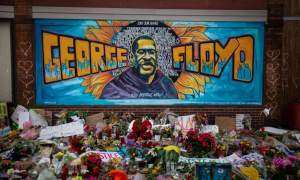 |
|
George Floyd makeshift memorial in Minneapolis
Cause of Death: Asphyxiation “I can’t breathe.”
|
Now, I should mention that I was born in Los Angeles. This city is home to me. I should also mention that throughout my life I have been an activist and taken to the streets on many occasions to protest the inequality or injustice that we have witnessed. But last night, the sounds of protest were diverted by the violence, the rioting and the looting. This morning to get to church I took those same streets that hours ago were trashed, torn and set on fire. This is my home that they are trashing. But I back up a bit and I see that it is in my home – in the United States of America – that racism still exists. It is here where we watched a man pinned down to the ground, begging for his life, saying, “I can’t breathe!” and left to die. And this morning, the world has taken notice.
No, if we’re going to do something let’s do it in a manner that is fitting of the title “First Christian Nation.” Today is Pentecost. It is a Christian Feast. It is the celebration of the coming of the Holy Spirit. This is the event that empowered the Disciples to become Apostles. They were students who had learned from Jesus and were now in charge of the taking the message to the four corners of the world. According to the Book of Acts, the Holy Spirit gave the Disciples the gift of language. Imagine that. Jesus wanted the world to hear his message. He didn’t send the Holy Spirit to empower these men with guns, weapons, political power, or a sword. Instead he gave them a tool by which they could spread the message of love, namely, language. In other words, he gave them the tool to communicate and share a message of hope with others.
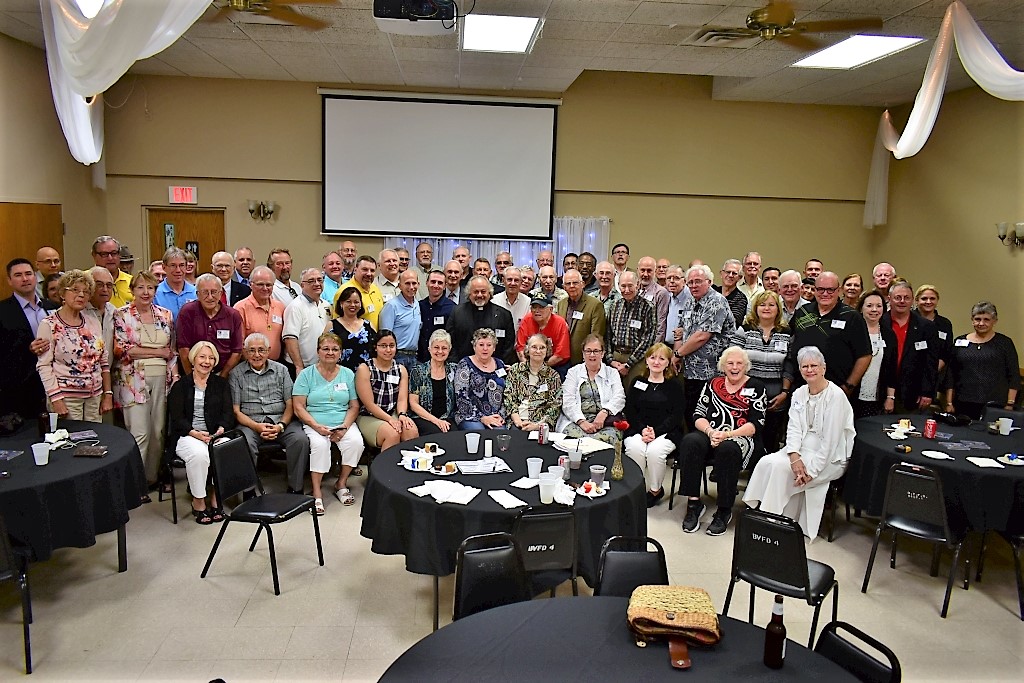
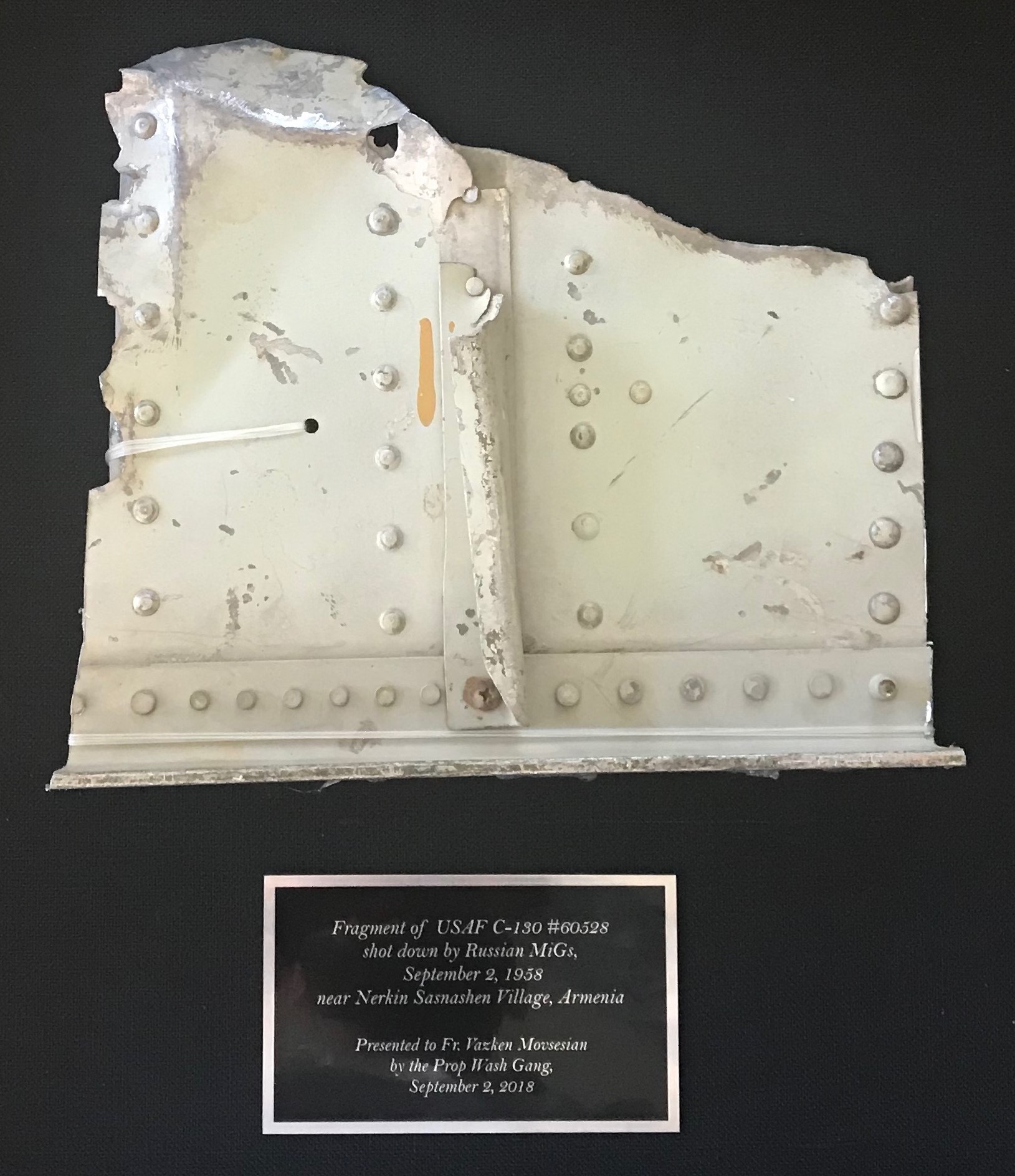 It was interesting that I sang the hymn in Armenian and no one in the audience understood the language, yet everyone knew very well what was happening. We were connecting as people. We were uniting the remote village of Sasnashen with Bellevue. Armenia was uniting with Nebraska and all of this to attest that a group of men were united with eternity.
It was interesting that I sang the hymn in Armenian and no one in the audience understood the language, yet everyone knew very well what was happening. We were connecting as people. We were uniting the remote village of Sasnashen with Bellevue. Armenia was uniting with Nebraska and all of this to attest that a group of men were united with eternity.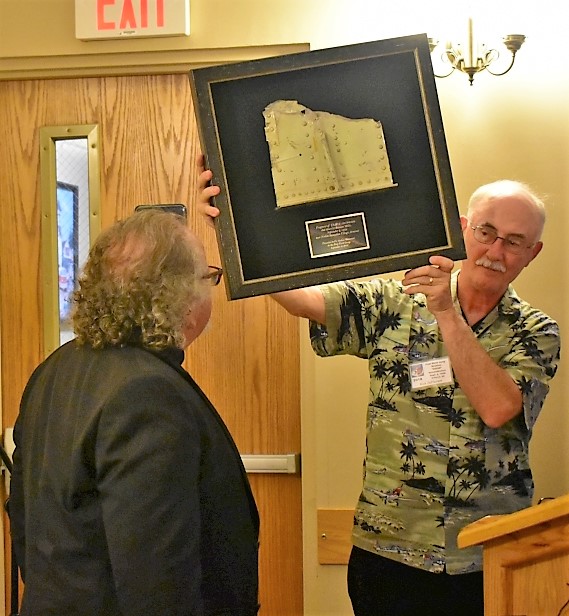
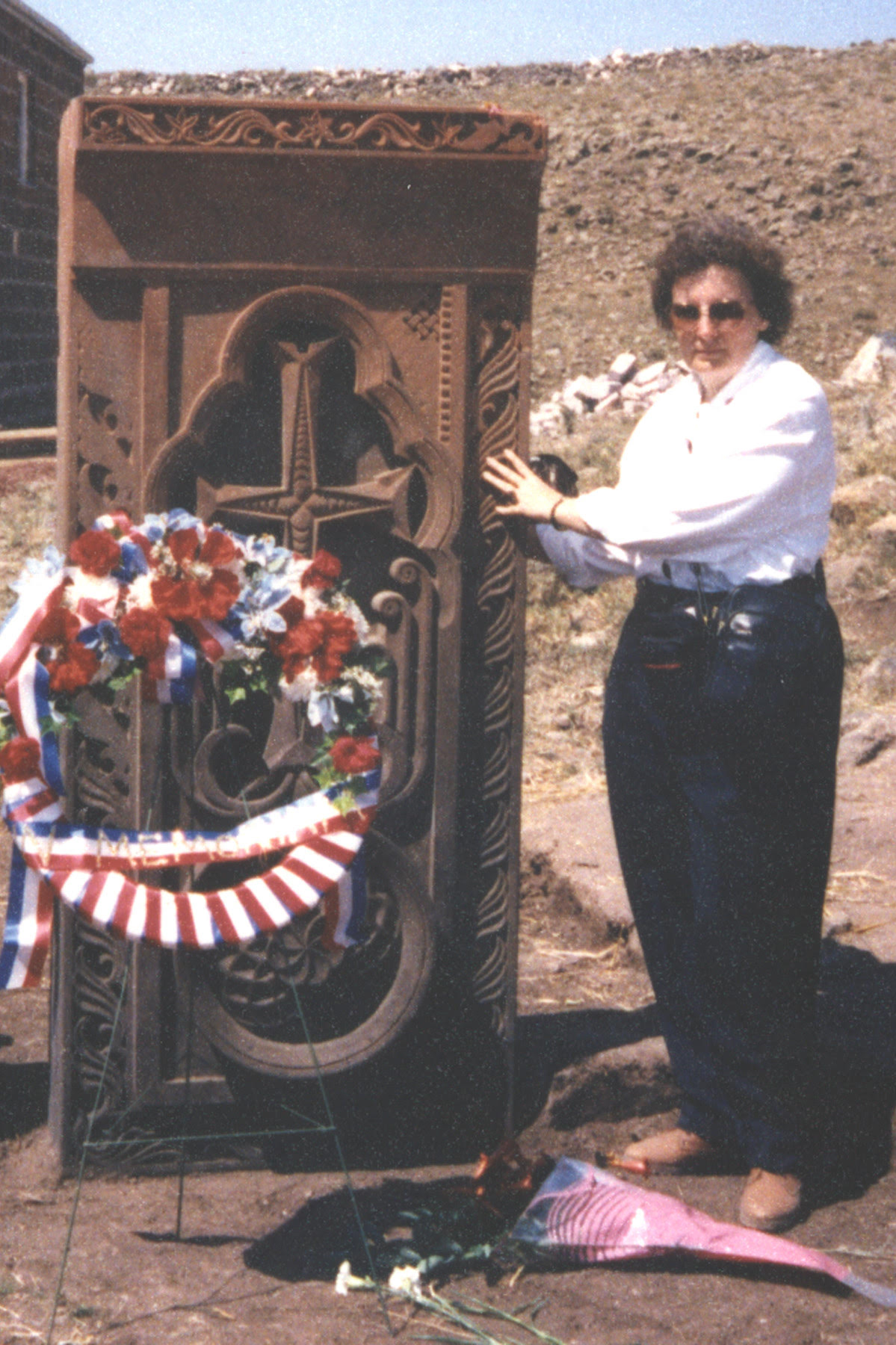 One of the eye-witnesses to the event was a young man, Martin Kakosian, a college student on a field trip in 1958. Kakosian, a skilled sculptor, later collaborated with the villagers to create a memorial — a khatchkar— honoring an unknown American crew that had died unceremoniously at the edge of their village. In late August 1993, Sasnashen village commemorated the 35th anniversary of the shoot-down during the unveiling of the khachkar.
One of the eye-witnesses to the event was a young man, Martin Kakosian, a college student on a field trip in 1958. Kakosian, a skilled sculptor, later collaborated with the villagers to create a memorial — a khatchkar— honoring an unknown American crew that had died unceremoniously at the edge of their village. In late August 1993, Sasnashen village commemorated the 35th anniversary of the shoot-down during the unveiling of the khachkar.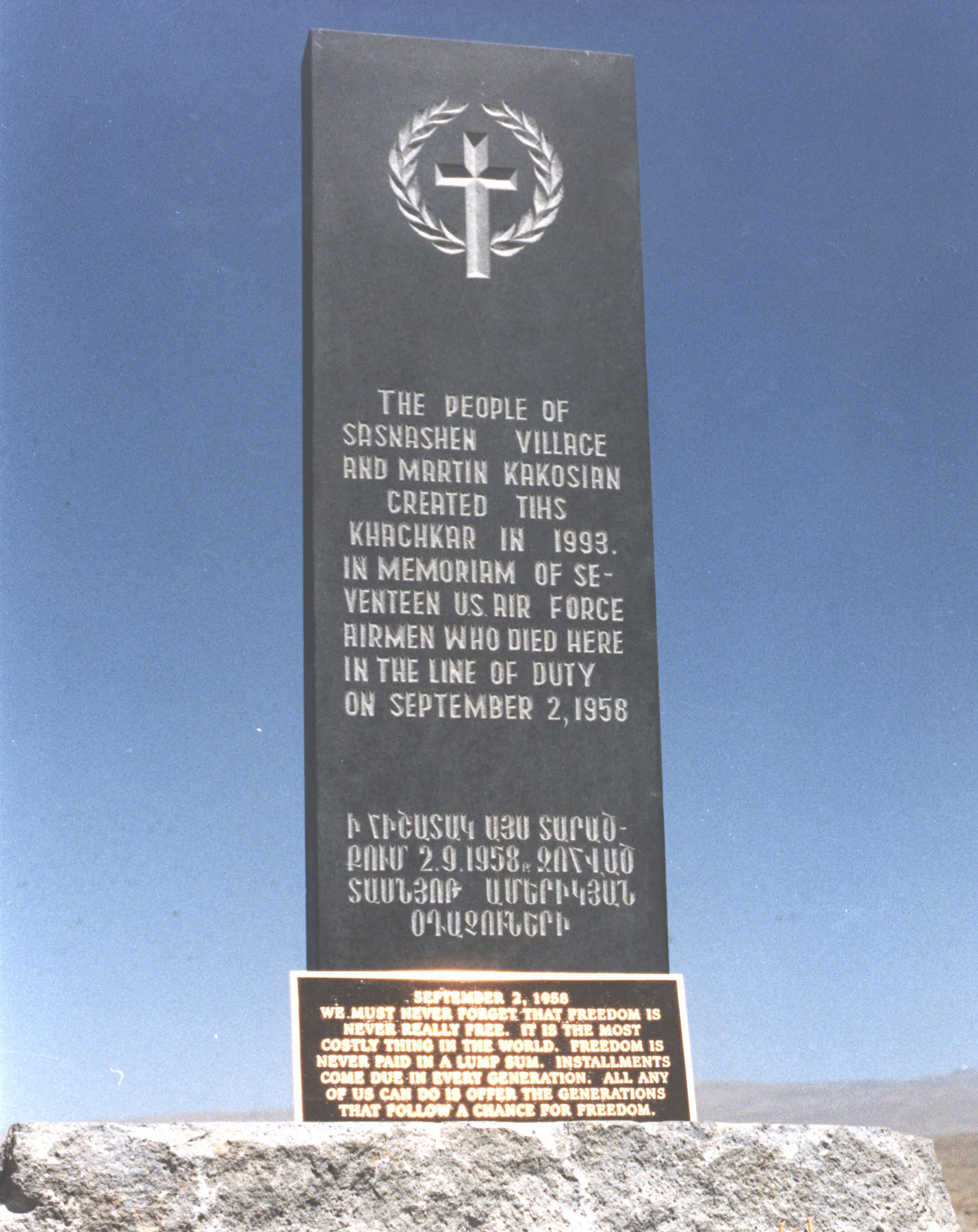 Furthermore, as an Armenian, I wanted to also emphasize the diverse set of circumstance which have contributed to Armenian history and to the events of the shoot down. As history will attest, Armenia and Armenians are often caught in the middle of battles not by our choosing. The US Air Force plane took off from bases in Eastern Turkey, that is, occupied Armenia. The plane was shot down over Armenia, occupied by the Soviets. (And yes, the plane was shot down by a Mig-17, named after Migoyan.) In every way Armenians are the by-standers to this particular history; nevertheless, Armenian have a message to share that can lead to healing.
Furthermore, as an Armenian, I wanted to also emphasize the diverse set of circumstance which have contributed to Armenian history and to the events of the shoot down. As history will attest, Armenia and Armenians are often caught in the middle of battles not by our choosing. The US Air Force plane took off from bases in Eastern Turkey, that is, occupied Armenia. The plane was shot down over Armenia, occupied by the Soviets. (And yes, the plane was shot down by a Mig-17, named after Migoyan.) In every way Armenians are the by-standers to this particular history; nevertheless, Armenian have a message to share that can lead to healing.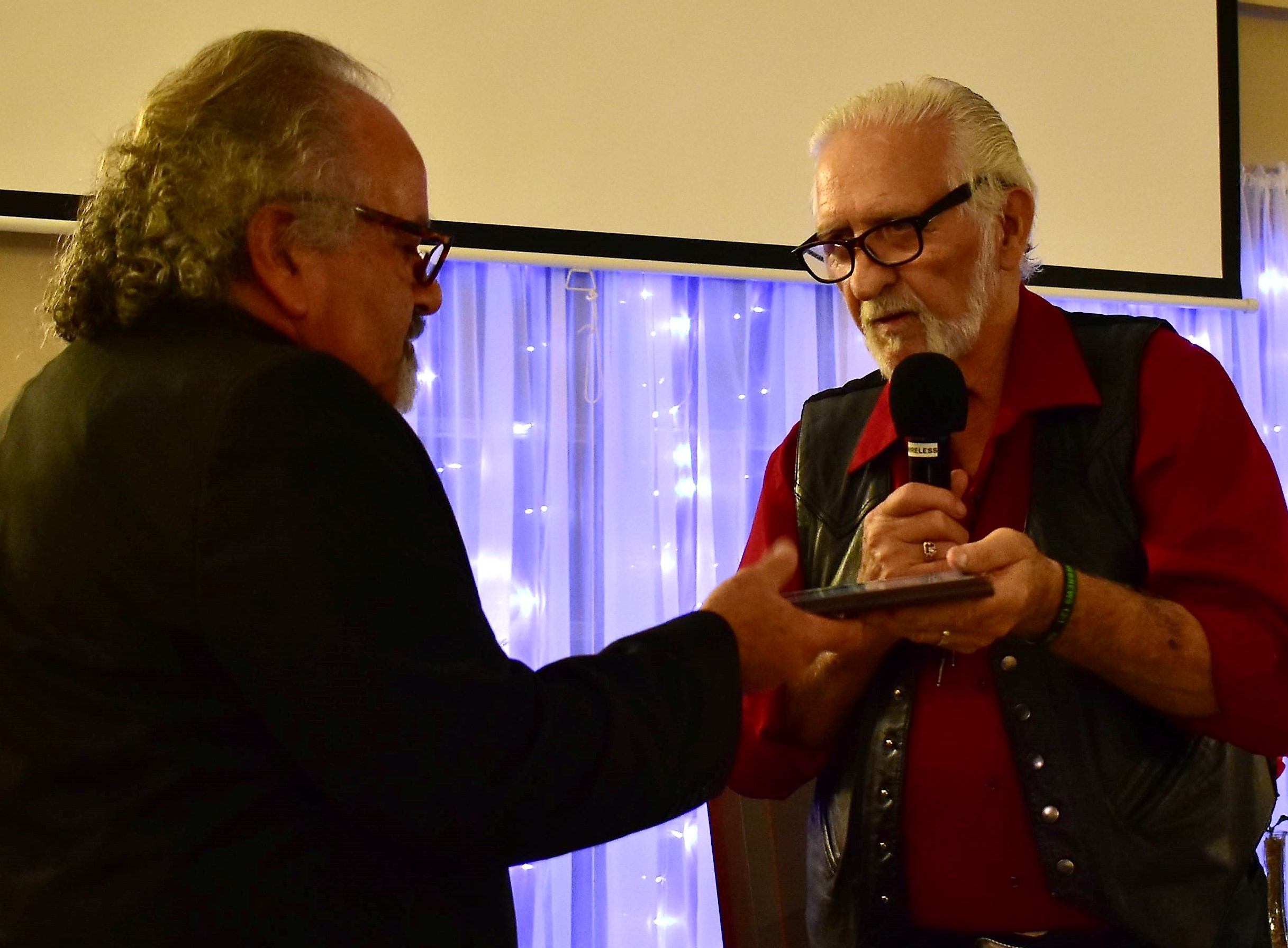 After I offered the ancient requiem prayer of the Armenian Church and remembered all 17 of the fallen servicemen by name, Chief Lonnie honored me in a manner I will forever remember. On behalf of the Prop Wash Gang he presented a shadow box with an actual piece of the downed-plane. Here I would have a tangible reminder of the sacrifice made by these men and the ever-essential necessity to stay vigilant against injustice. He also gifted me Larry Tart’s book, “The Price of Vigilance” signed by the author. These are the treasures, coupled with the stories I heard, that I return to the Diocese to share with Armenian men and women of all ages.
After I offered the ancient requiem prayer of the Armenian Church and remembered all 17 of the fallen servicemen by name, Chief Lonnie honored me in a manner I will forever remember. On behalf of the Prop Wash Gang he presented a shadow box with an actual piece of the downed-plane. Here I would have a tangible reminder of the sacrifice made by these men and the ever-essential necessity to stay vigilant against injustice. He also gifted me Larry Tart’s book, “The Price of Vigilance” signed by the author. These are the treasures, coupled with the stories I heard, that I return to the Diocese to share with Armenian men and women of all ages.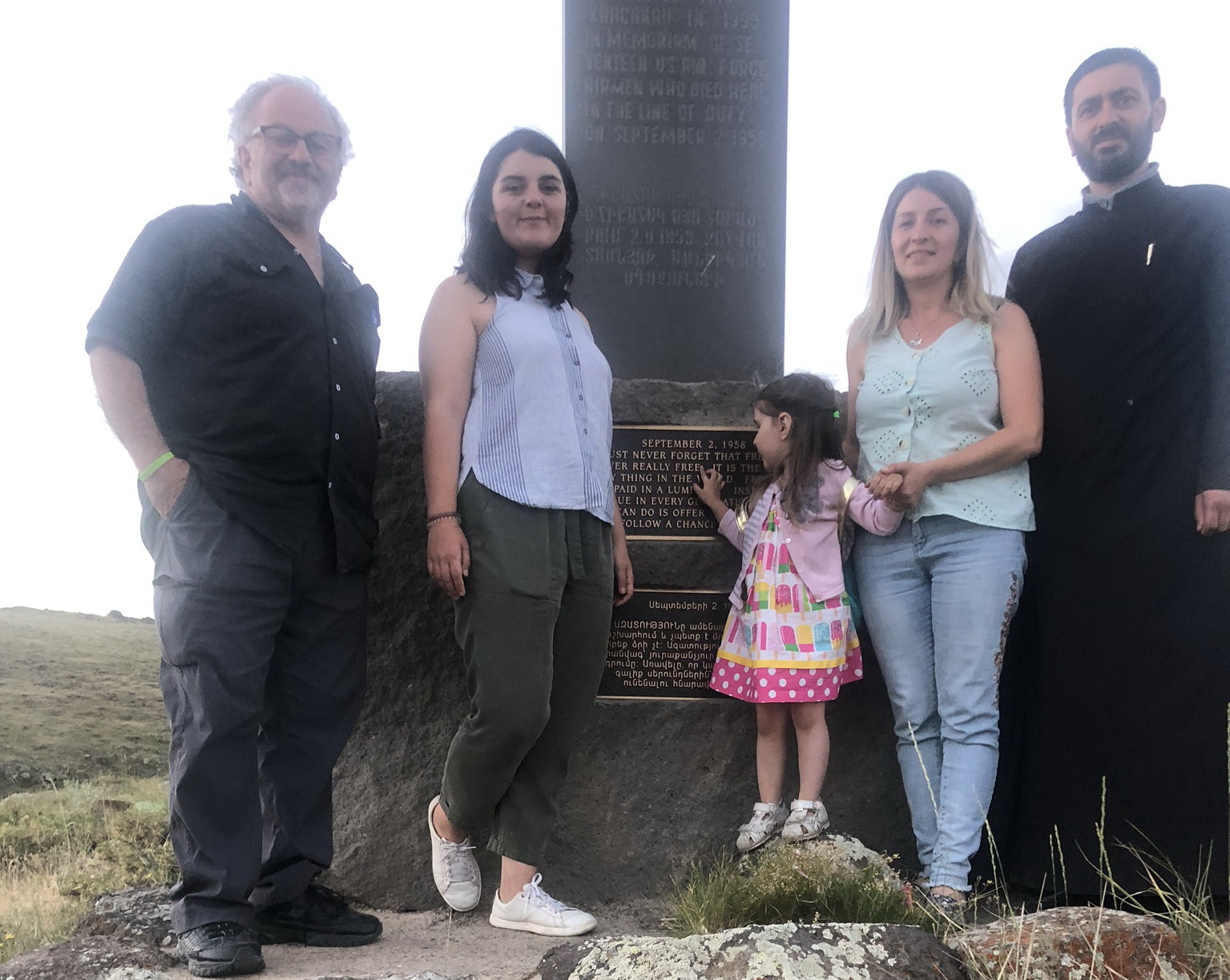
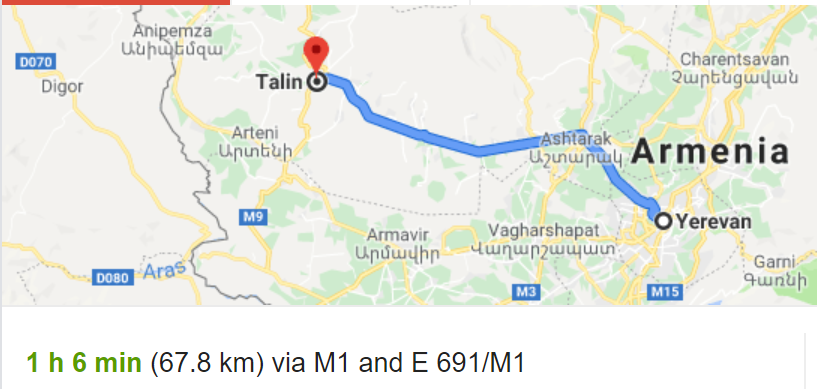
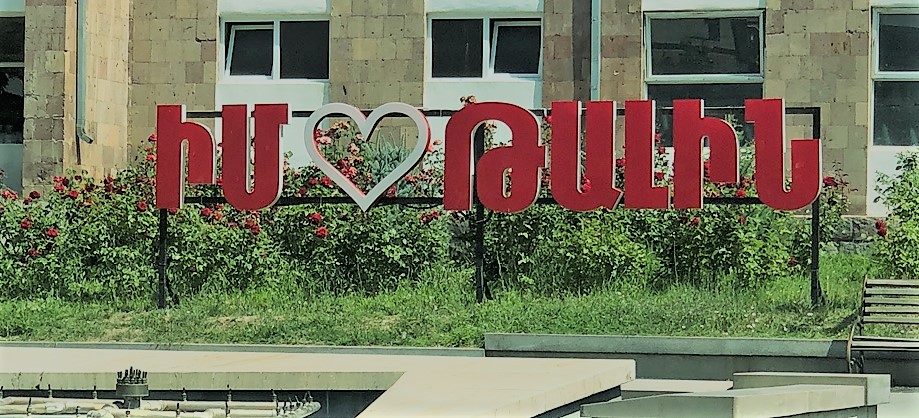
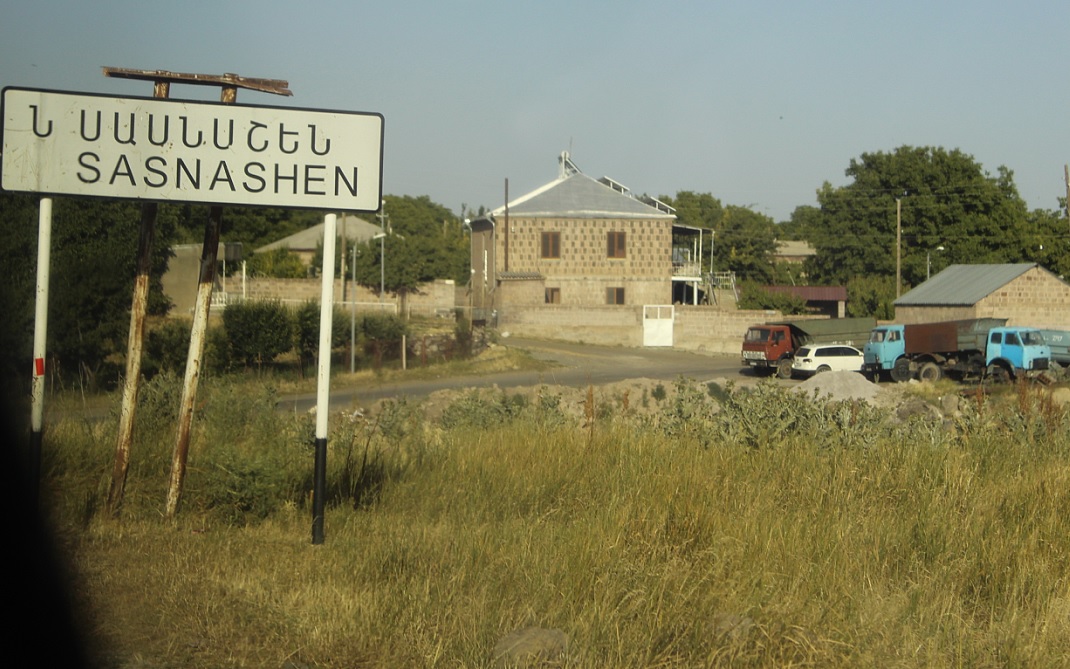
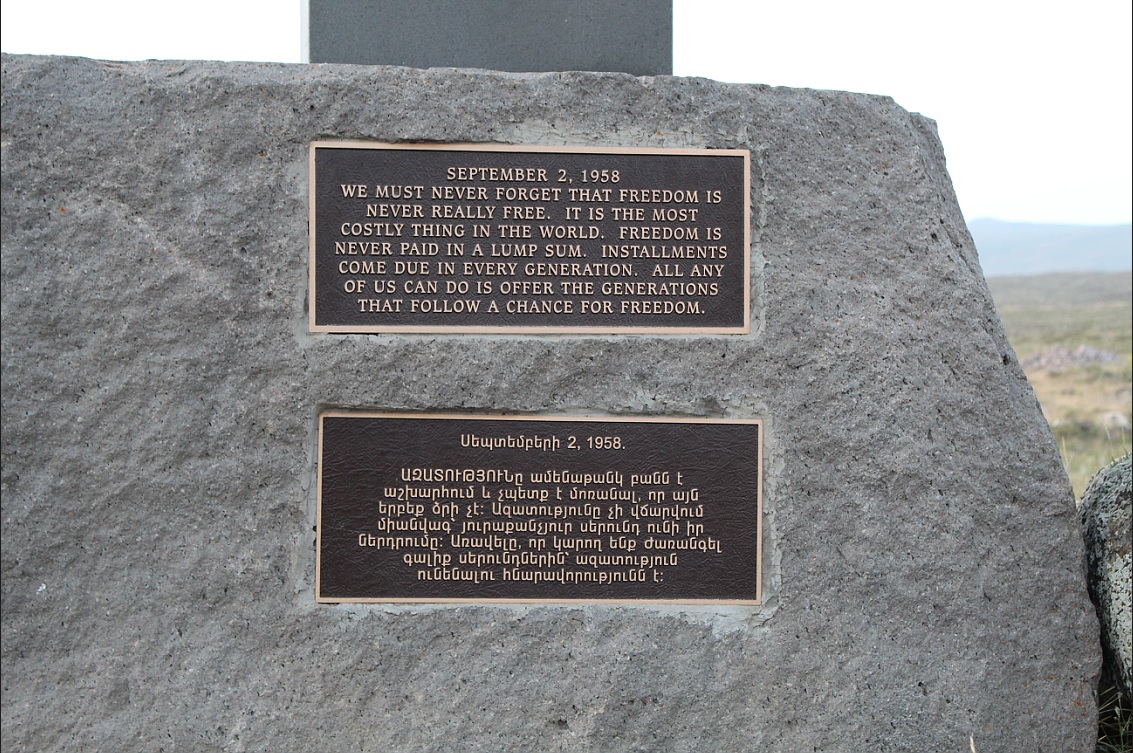
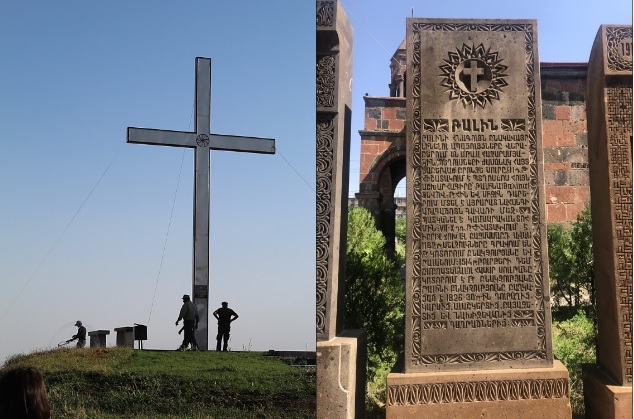
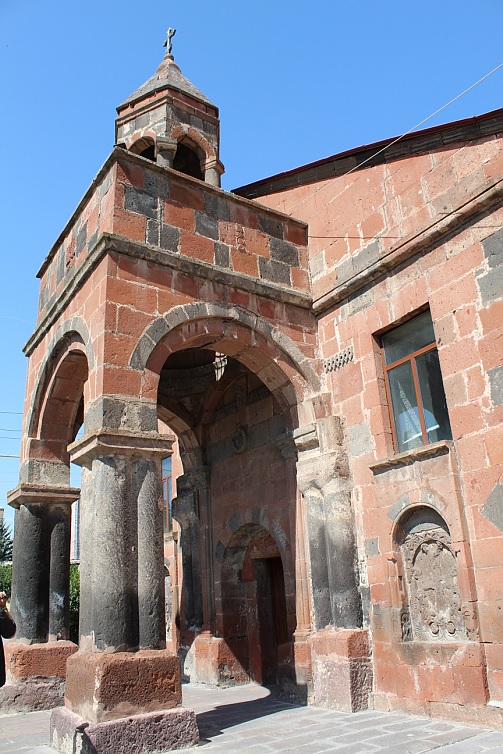 There, under the open skies and the silence of the village we offered a prayer for the 17 fallen servicemen as well as a prayer for peace.
There, under the open skies and the silence of the village we offered a prayer for the 17 fallen servicemen as well as a prayer for peace.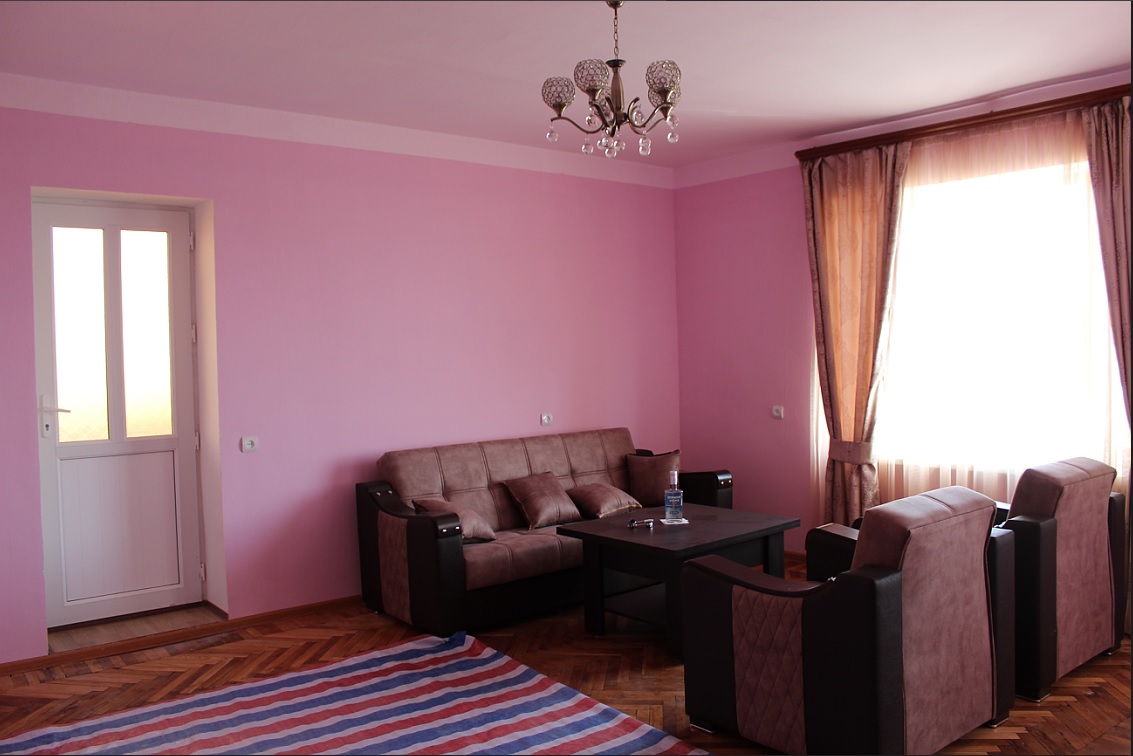
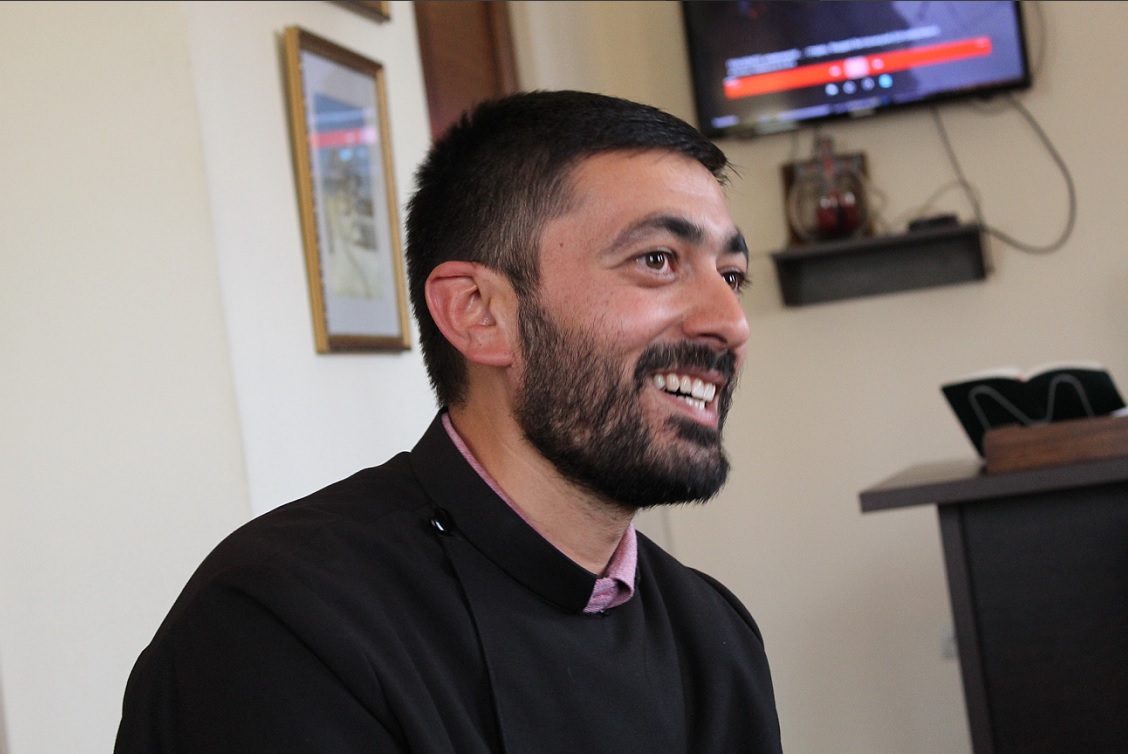 On July 18, 2019 I personally made a trip to the area to monitor progress and meet with Fr. Tadé and others to discuss the program. I also met with the head of the Aragatsotn Diocesan, Bishop Mkrtich Proshyan to assure a proper working relationship between all of our parties. He officially pronounced the name of this project as Sasnashen Youth Center and we are scheduled to open on September 29, 2019. It will be dedicated in the name of the servicemen who perished in the village in 1958. A framed piece of the plane will be presented to the Center at that time.
On July 18, 2019 I personally made a trip to the area to monitor progress and meet with Fr. Tadé and others to discuss the program. I also met with the head of the Aragatsotn Diocesan, Bishop Mkrtich Proshyan to assure a proper working relationship between all of our parties. He officially pronounced the name of this project as Sasnashen Youth Center and we are scheduled to open on September 29, 2019. It will be dedicated in the name of the servicemen who perished in the village in 1958. A framed piece of the plane will be presented to the Center at that time.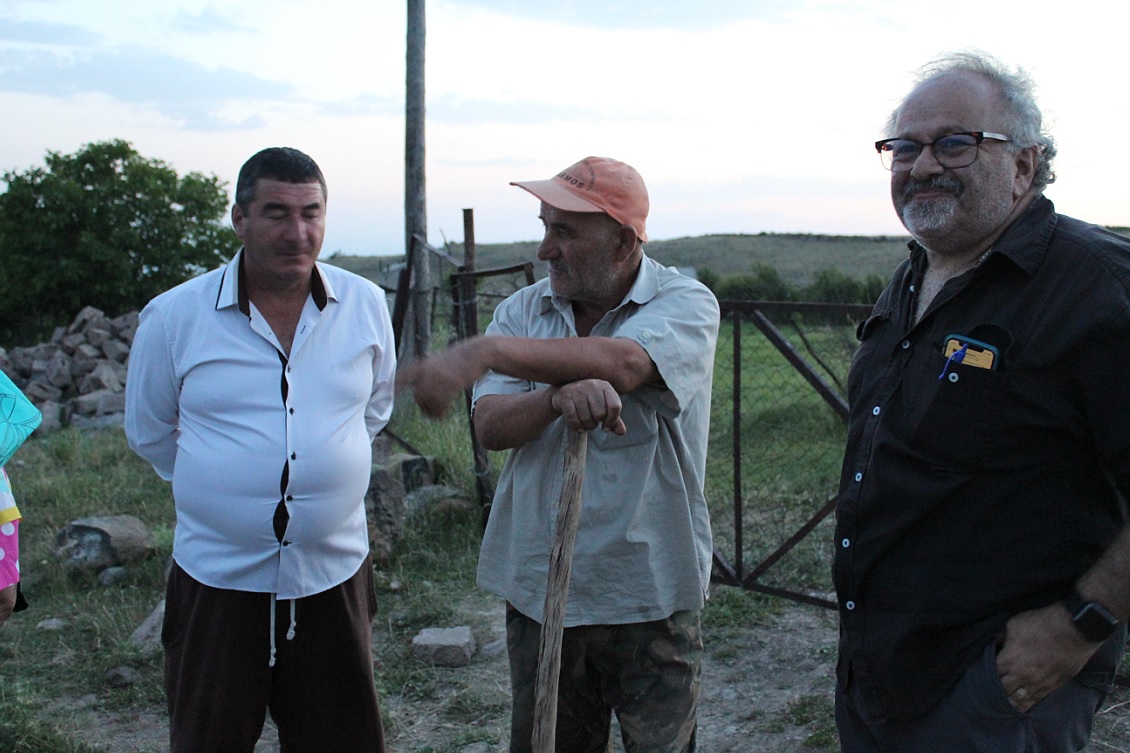
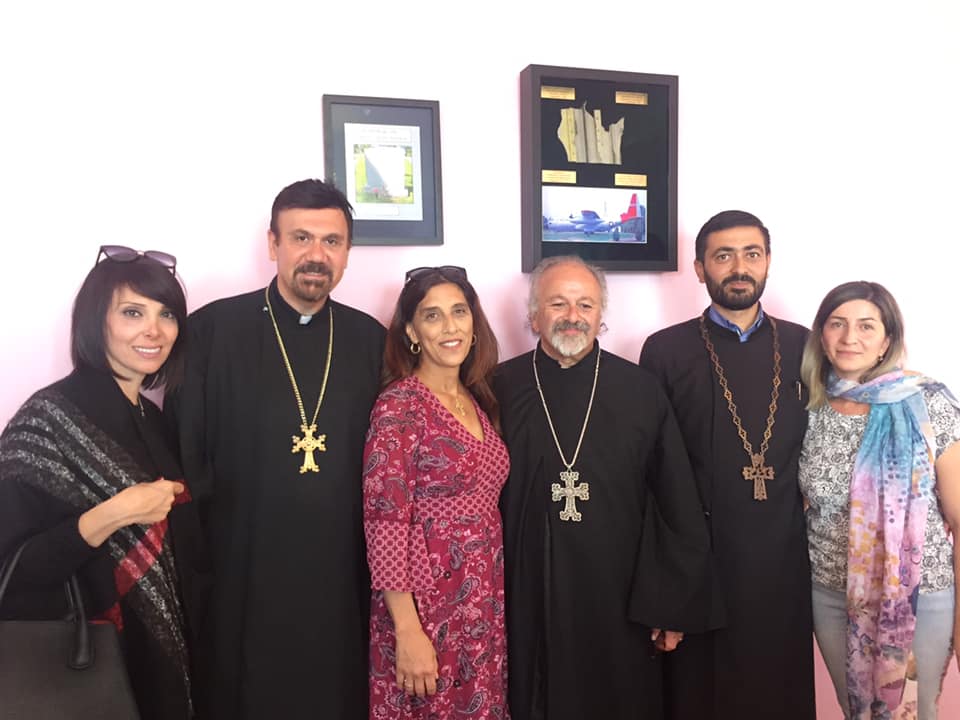
(Photo Caption: from Left to Right) Yn. Talin and Fr. Haroutiun Tachejian, Yn. Susan and Fr. Vazken Movsesian, Fr. Tadé and Yn. Hripsimé Takhmazian in front of the plaque with the names of the fallen service man and a framed piece of the plane which was shot down on September 2, 1958.
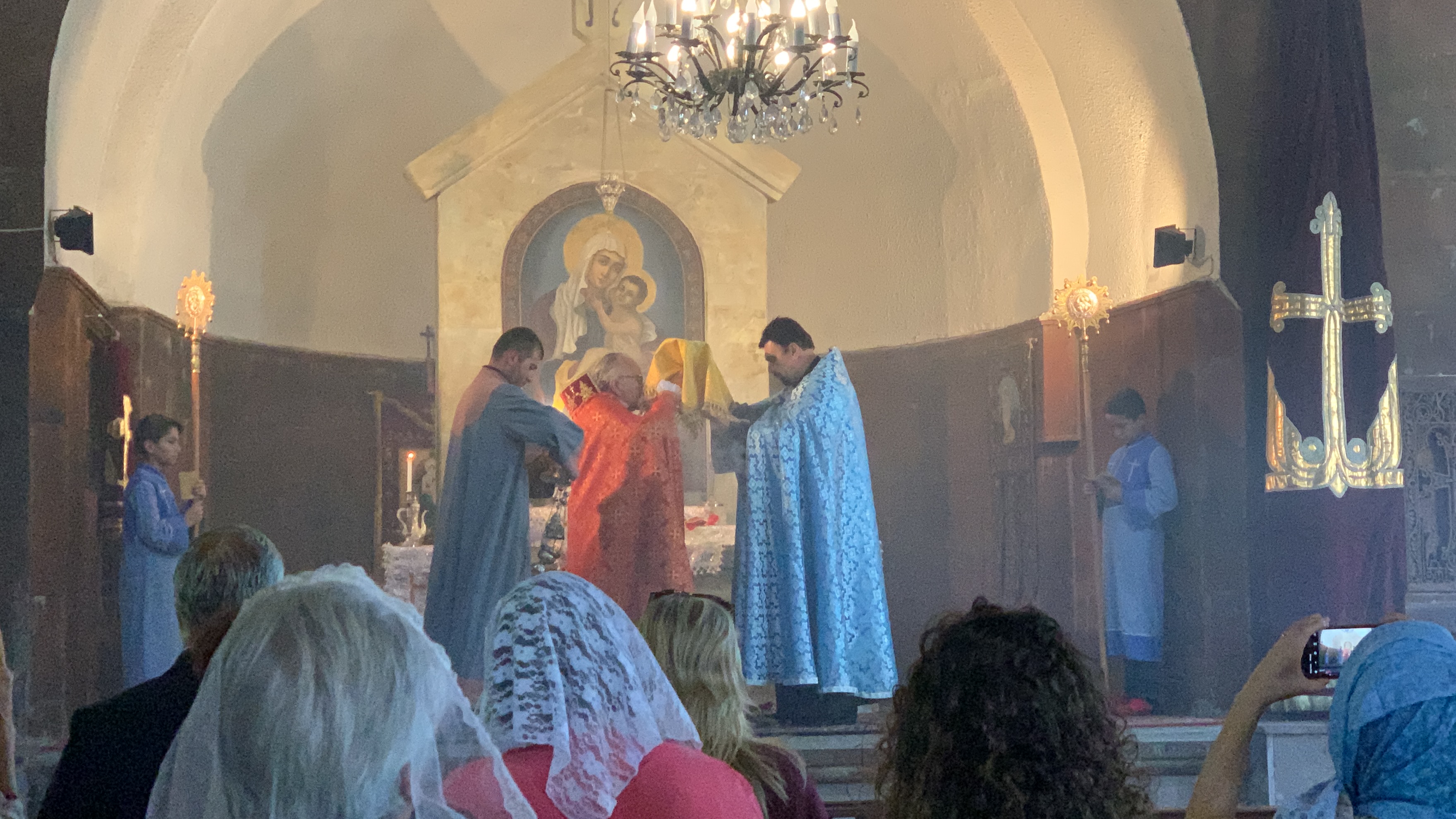
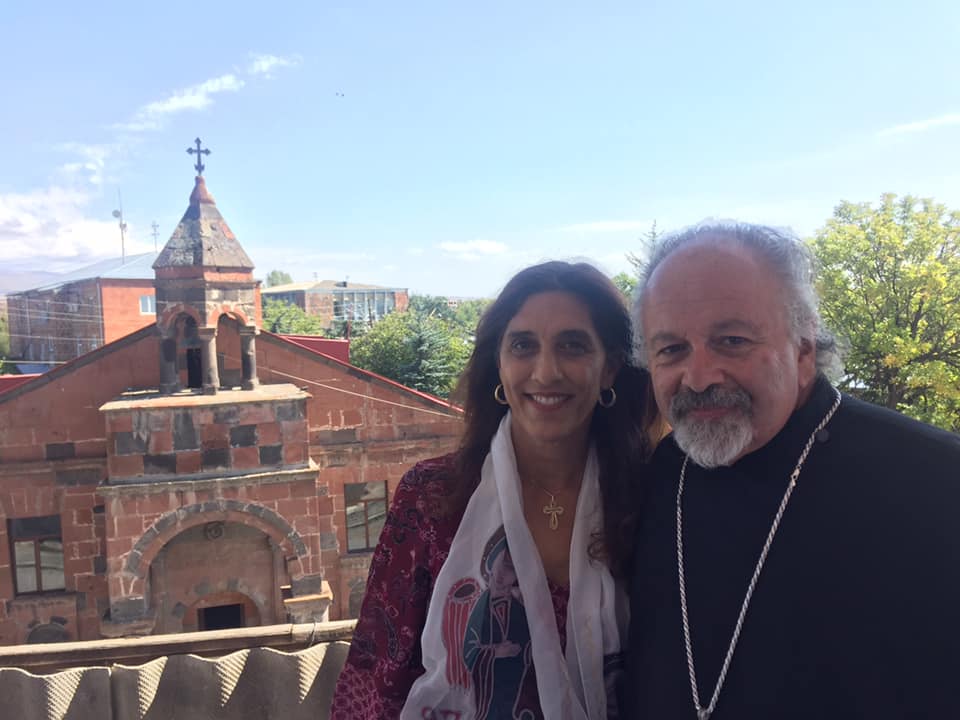 Following the service in church, Fr. Tadé led us to the newly renovated house and we officially dedicated and opened it as the Sasnashen Youth Center with a ribbon cutting ceremony. I offered the warmest greetings of His Eminence Archbishop Hovnan Derderian who has set the vision for our involvement in Armenia at this level. In turn Fr. Tadé thanked the local primate, His Grace Bishop Mkrtich Broshyan, for granting this opportunity for expansion.
Following the service in church, Fr. Tadé led us to the newly renovated house and we officially dedicated and opened it as the Sasnashen Youth Center with a ribbon cutting ceremony. I offered the warmest greetings of His Eminence Archbishop Hovnan Derderian who has set the vision for our involvement in Armenia at this level. In turn Fr. Tadé thanked the local primate, His Grace Bishop Mkrtich Broshyan, for granting this opportunity for expansion.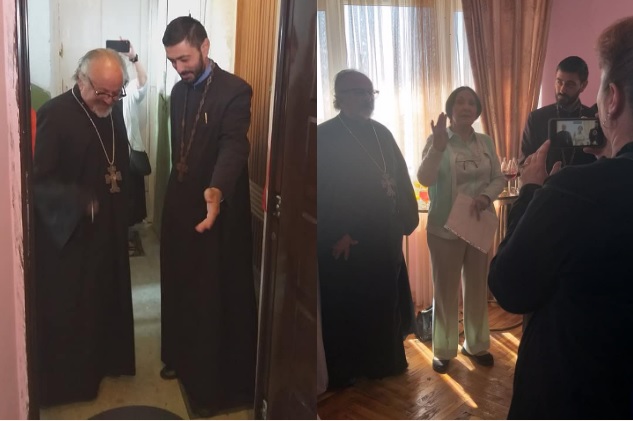
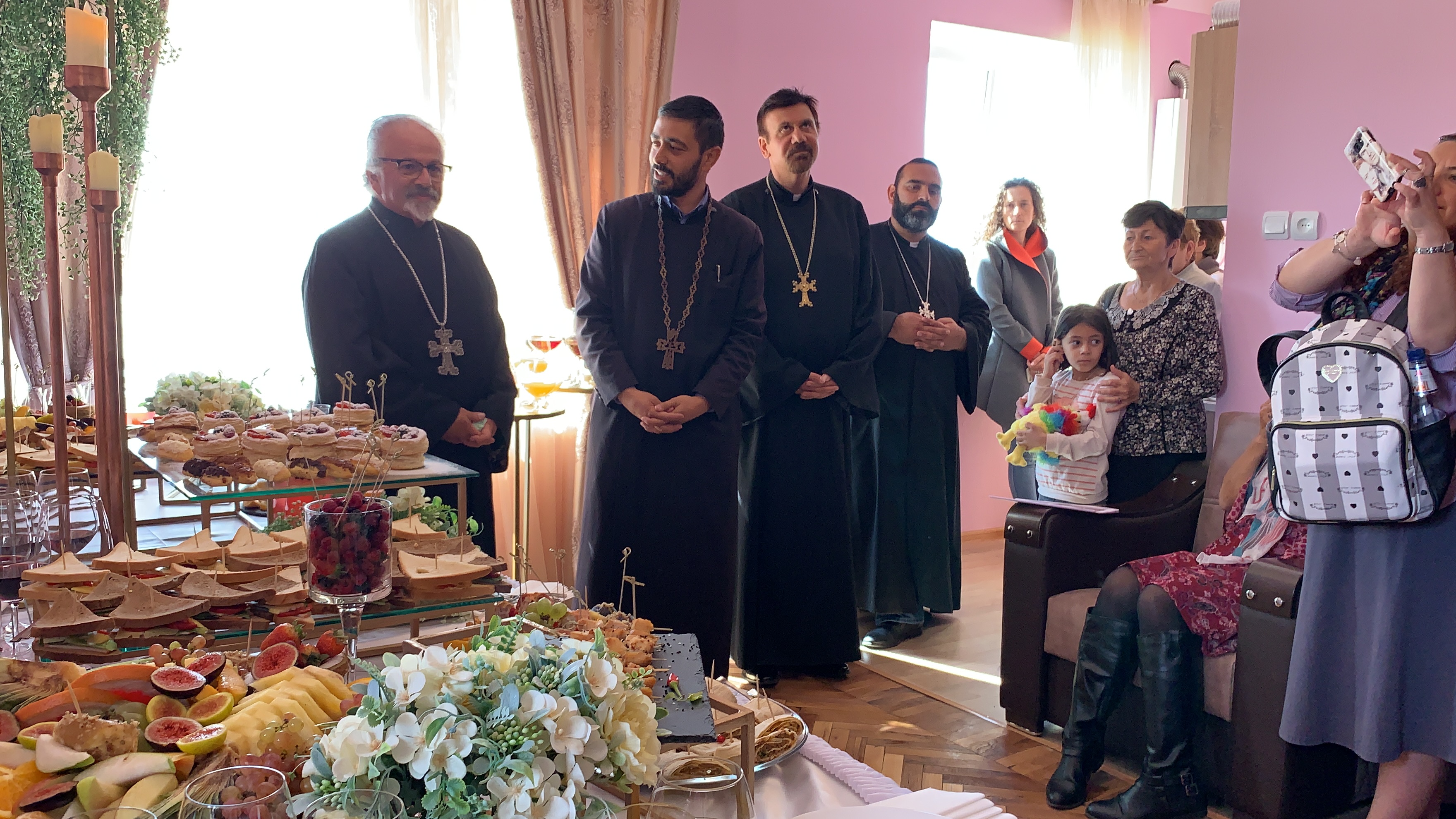
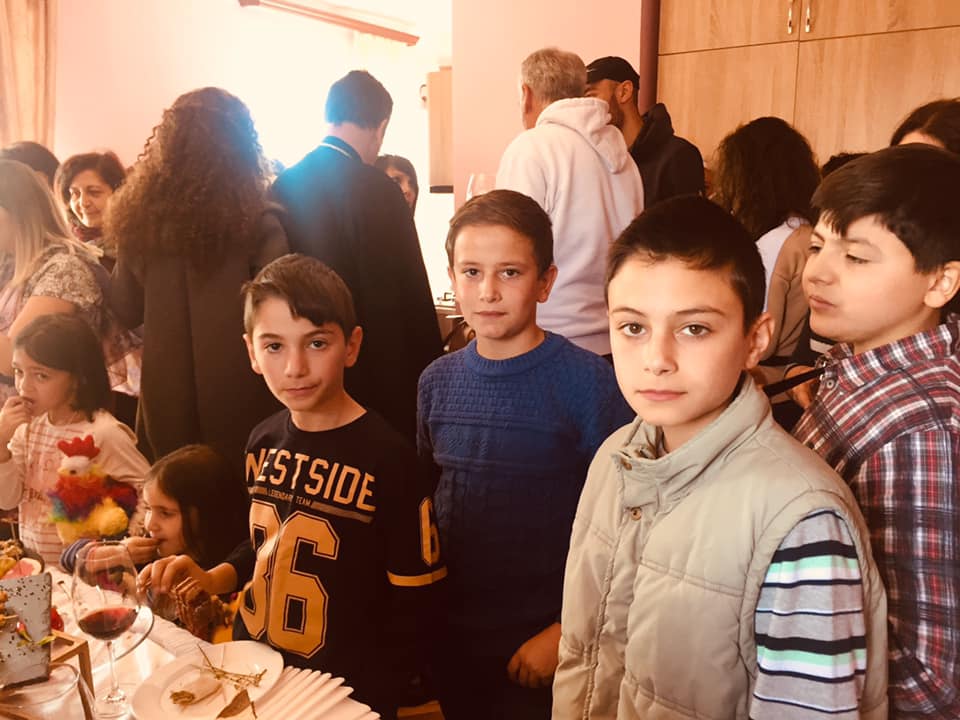
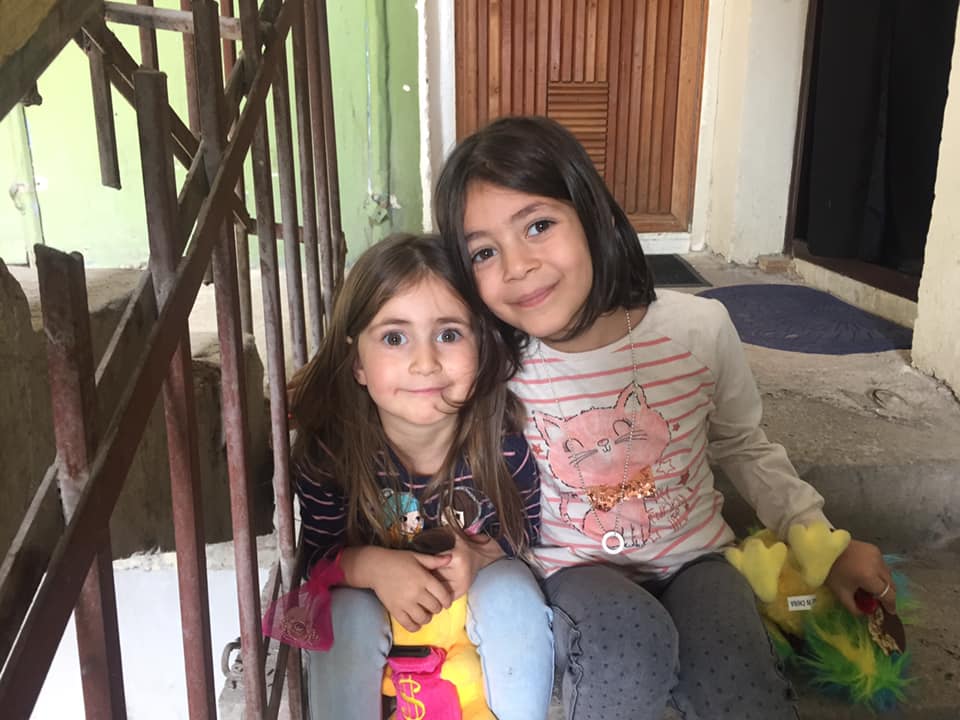
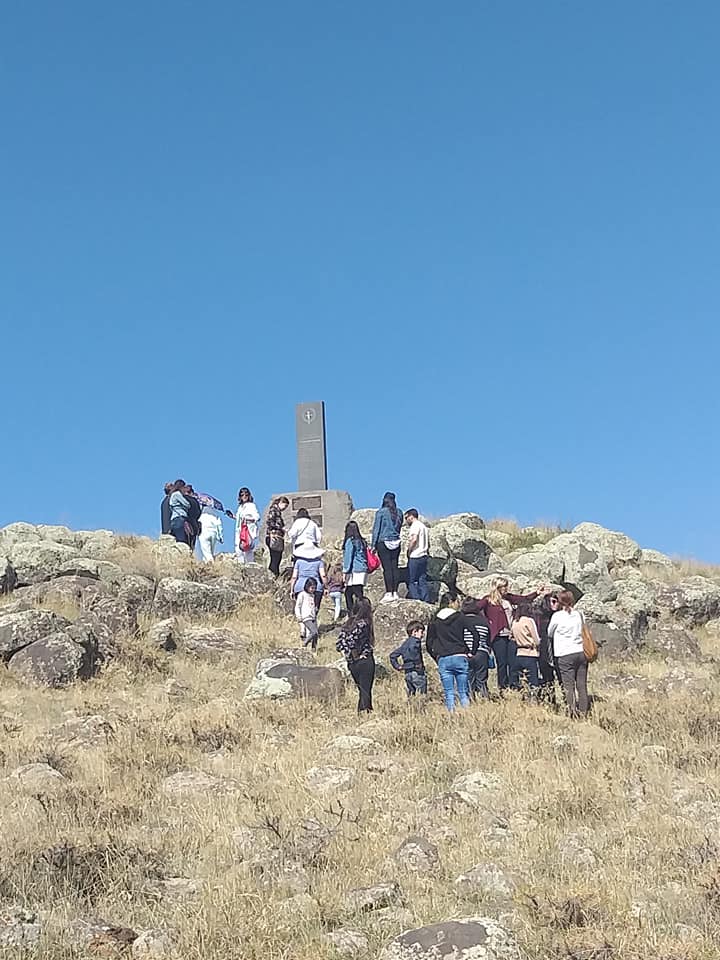
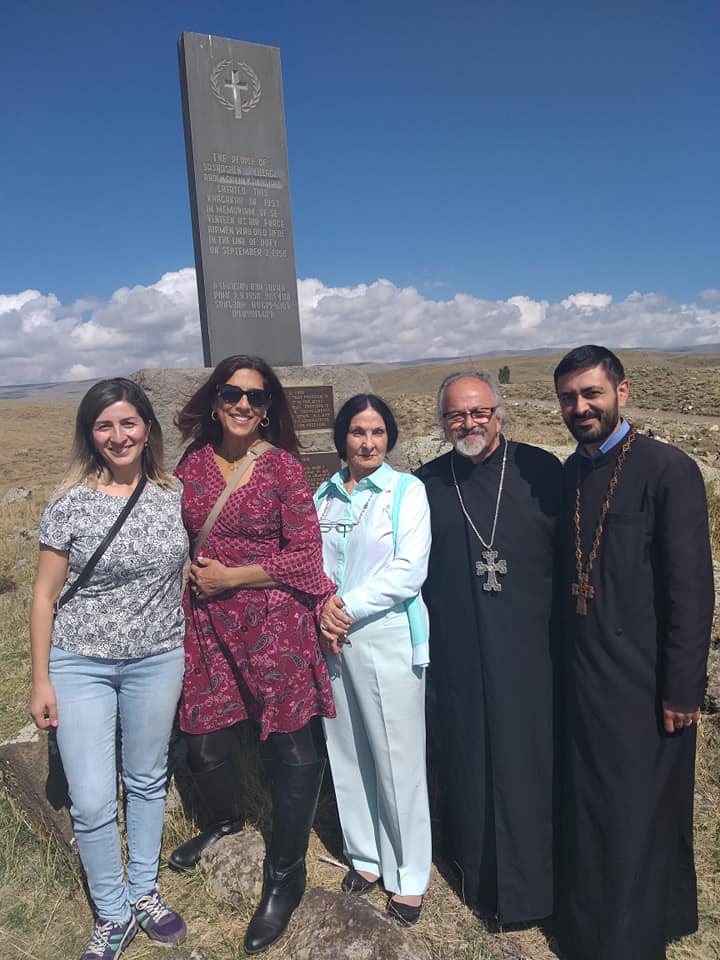

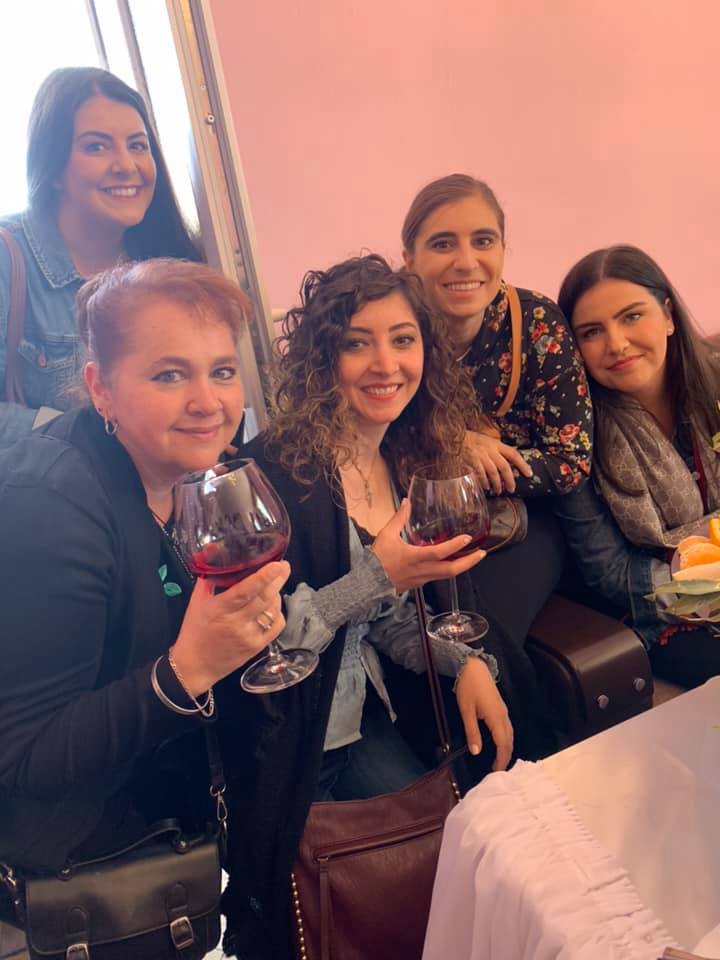 We arranged with one of the with one of the local village families to host a lunch/celebration. Inside their house we truly celebrated with food, wine, song and dance. Today, from the midst of tragedy, a new chapter was being opened in the life of the village and in the life of young people wanting an opportunity for a better life. Many of the villagers suffer immense economic hardships. Education and building up self-worth are the cornerstones of this project.
We arranged with one of the with one of the local village families to host a lunch/celebration. Inside their house we truly celebrated with food, wine, song and dance. Today, from the midst of tragedy, a new chapter was being opened in the life of the village and in the life of young people wanting an opportunity for a better life. Many of the villagers suffer immense economic hardships. Education and building up self-worth are the cornerstones of this project.
| ACYO Central Council 1960, San Francisco |
 In the Los Angeles area, as well as throughout the world, we were coming to terms with our living in the diaspora and the ugly reality which caused the diaspora phenomenon. We heard the stories of mass atrocities from our grandparents and collectively we demonstrated for justice. In Montebello, the Armenian Genocide Martyrs Memorial Monument was being planned. My father was on the building committee for this structure and as children we were there for all the milestones: groundbreaking, fundraisers and endless speeches. Then in 1968, the Monument was to open to the public. His Holiness Vazken I was there from Armenia. His presence, his charisma, his mannerism and his words said in a united voice for All Armenians: the Armenians have arrived. There is no hiding the truth! The Genocide will never be forgotten.
In the Los Angeles area, as well as throughout the world, we were coming to terms with our living in the diaspora and the ugly reality which caused the diaspora phenomenon. We heard the stories of mass atrocities from our grandparents and collectively we demonstrated for justice. In Montebello, the Armenian Genocide Martyrs Memorial Monument was being planned. My father was on the building committee for this structure and as children we were there for all the milestones: groundbreaking, fundraisers and endless speeches. Then in 1968, the Monument was to open to the public. His Holiness Vazken I was there from Armenia. His presence, his charisma, his mannerism and his words said in a united voice for All Armenians: the Armenians have arrived. There is no hiding the truth! The Genocide will never be forgotten.  My dad gave me a small camera that day to photograph the scenes. He was busy with the organizing efforts involving thousands of Armenians and dignitaries who had come to pay respect to the past but also to celebrate the presence of the leader of the most ancient Christian tradition on Earth. To this day I remember that camera – a Mansfield using 127 film. I snapped away and with each click of the shutter I was building a library of memories that would serve as the platform for my future ministry. His Holiness had given the community a booster shot to stay vigilant in the quest for justice. But for this young boy, it was among my first major dose of the vaccination against apathy and indifference. Even going to school during those days was a pleasure because I didn’t have to search for current events: I was living through history.
My dad gave me a small camera that day to photograph the scenes. He was busy with the organizing efforts involving thousands of Armenians and dignitaries who had come to pay respect to the past but also to celebrate the presence of the leader of the most ancient Christian tradition on Earth. To this day I remember that camera – a Mansfield using 127 film. I snapped away and with each click of the shutter I was building a library of memories that would serve as the platform for my future ministry. His Holiness had given the community a booster shot to stay vigilant in the quest for justice. But for this young boy, it was among my first major dose of the vaccination against apathy and indifference. Even going to school during those days was a pleasure because I didn’t have to search for current events: I was living through history. |
| With my sister, January 1978 |
 |
| Easter Week 1978 |
 |
| Blessing in San Francisco 1987 |

 |
| The python hold on his namesake |
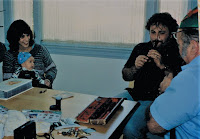 |
| Facilitating a session of duduk play |
 |
| Statue of Garegin Njdeh – inscription: “God, Nation, Fatherland. Live and work only for those things that are worth dying for and dye only for those things that are worth living for.” |
 |
| Sunset at Lake Sevan – 2014 |
Sermon at the “Service of Darkness”
Holy Thursday, 18 April 2019, St. Leon Armenian Cathedral, Burbank, California
at the invitation of His Eminence Abp. Hovnan Derderian, Western Diocesan Primate
by Fr. Vazken Movsesian
It is common knowledge that freedom of speech has restrictions. You cannot yell “fire” in a crowded theater and claim “free speech.” In fact, the idea of falsely shouting “fire” in a crowded theater arose 100 years ago from the Supreme Court’s 1919 decision in the case Schenck v. United States. The Court ruled unanimously that the First Amendment, though it protects freedom of expression, does not protect dangerous speech.
It is about that dangerous speech that I write. Bizarre and false allegations are not an exercise of free speech. they are merely sensationalized expressions to raise interest and profits. Much has been written and reported about the correlation between sensationalized news and big profits; unfortunately, this time it is coupled with dangerous speech.
In particular, recently along with several of my clergy brothers, I was featured on the pages on a tabloid called “USA Armenian Life” published by Appo Jabarian. My image and name were used to present me as a disgruntled member of the Western Diocese of the Armenian Church. Really? No reporter visited, called or talked to me, nor to many of the other priests that were featured in the story. In fact, two of the pictured priests have long since died. Capturing my image and spreading hearsay, he has sensationalized false and rumored stories that somehow I, and other clergy, are left no alternative but to exercise our faith via his tabloid. There is no investigative journalism here, only the spreading of gossip in a defamatory manner. This is dangerous speech because it twists, turns and distorts. It mocks reality.
Let it be clear that the Armenian Church has its organization, its structure and its hierarchy. I choose – yes choose – to exercise my priesthood through those channels and not on the pages of a tabloid filled with such vile and revolting displays of false news. He has no business using my name nor image in an effort to increase his profits. The Net contains 30+ years of my blogs, videos and writings which I have dedicated to issues of Church growth and Faith. I have chosen to work through these issues inside of the Church and not outside of it.
Even more tragic is that via this tabloid the publisher is on a campaign to discredit clergy and church leaders. Under the guise of church reform he is hate mongering and playing off of the sensitive and volatile political climate we feel around us. The speech exercised therein is dangerous, manipulative and sensational, all to increase his personal profits with complete and total disregard for the welfare of the community.
The banner atop this tabloid reads, “Diaspora’s most widely acclaimed and circulated…” Acclaimed by who? Most widely circulated? How? By bulk mailing free copies to homes that have an “ian” or “yan” descriptors on their name? It’s obvious that this is a tactic to increase revenues for an ailing and sick print-industry. Instead of catching up with the times, the publisher is trying to keep the sinking ship floating by sensationalizing information.
The Armenian Church has its challenges. The Catholicos, the Primate and the priests roll-up their sleeves and work toward solutions to the best of their human capability. Those who can do, those who can’t criticize.
 ur ears were filled with poetry that rhymed with the harmony of the world. And, if you ever were the object of her prayers, you received a blessing in your life that was from her connection to the Divine.
ur ears were filled with poetry that rhymed with the harmony of the world. And, if you ever were the object of her prayers, you received a blessing in your life that was from her connection to the Divine.
